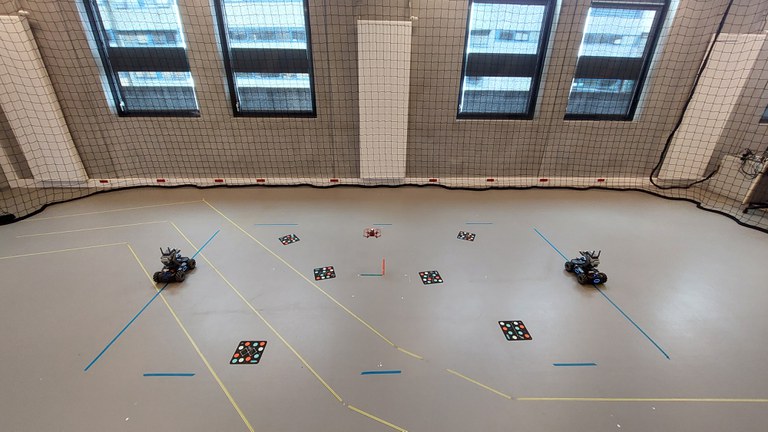(Re)CreativeRobot: (Re)Creative Mobile Robotics for Kids
Activity Organizer
Cristina Stoica (CentraleSupélec/L2S, Gif-sur-Yvette cedex, France)
IFAC Sponsor: TC 9.2
Description:
The aim of this project was to propose new on-site perennial interactive workshops for children and youths to develop practical skills on mobile robots and drones, motivating them to continue their curriculum in engineering.
These Mobile Robotics workshops were initially intended to be implemented during the annual national event “Fête de la Science”, which is a large-scale science festival, created more than 30 years ago, and organized yearly by the French Ministry of Higher Education, Research and Innovation to promote and popularize science in France. In addition, the developed resources and workshops were presented during numerous events in CentraleSupélec, Laboratory of Signals and Systems, and Paris-Saclay University.
The project had two phases:
- Phase I (Workshop on Mobile Robotics, “Fête de la Science 2022” edition and beyond): A first workshop involving the use of ground robots (DJI Master Robot S1) was proposed in October 2022 for the general public visiting the flight arena of CentraleSupélec. The scientific content of the workshop goes from Programming (in Scratch) to Robotics and Control Engineering, with specific pedagogical approaches, developed in the following three steps, see [1]:
I.1. Single robot & Single child: The first version of the workshop proposed several basic exercises in Scratch allowing each kid to control one mobile robot, i.e. single robot control by one kid.
I.2. Single robot & Multiple children: In the next stage, the workshop was adapted in order to allow one small group of children to implement elementary exercises in Scratch (e.g., tracking a specific trajectory or a specific robot) on the robot allocated to their group, i.e. single robot control by several children. Two sessions were organized for the 9-years old pupils (who already have basic notions of Scratch) of the primary school Roger Ferdinand, in Palaiseau (in the Paris Region), allowing them to work in teams of two or three kids on the same robot.
I.3. Multiple robot & Multiple children: These approaches were developed to teach children the advantages of collaborative work and to make the link with basic notions of Multi-Agent Systems, e.g., implementing basic leader-follower/platooning concepts with five robots, drawing the IFAC logo via light painting with one or several robots. Indeed, each group of children programmed a specific task on one robot. Putting together the work of all the groups led to a much elaborated result (see video example https://youtu.be/3UXQVUPvKN4).
Part of the developed pedagogical material is available on https://github.com/L2S-lab/ReCreative_Robot_ICSTCC2023.
- Phase II (Workshop involving both ground and aerial vehicles, “Fête de la Science 2023” edition and beyond): A second workshop was proposed for the 2023 edition of this science festival, in the flight arena of CentraleSupélec. For this event, a new pedagogical game was developed: the classic Atari Pong game was adapted to a real-world setup with two mobile ground robots acting as paddles and one drone as ball. A repository containing the open-source code is available at https://github.com/L2S-lab/dropong. A video illustrating the different stages of the DroPong development (2D case with three ground robots, 3D case with two ground robots and one drone, both in simulation and experimentation) is provided at https://youtu.be/whsnMcFf8ZQ. The workshop timeline, together with feedback from participants and lessons learned are provided in [2].
In addition, all these activities were proposed for children (approx. 350 children and youths) and general public visiting CentraleSupélec, Laboratory of Signals and Systems, and Paris-Saclay University at numerous occasions, e.g.:
- several 15-16 years old children during their 1-week or 2-week internships at CentraleSupélec,
- numerous visits for secondary and high-school learners organized by the Center of Diversity and Inclusion of CentraleSupélec,
- one visit for children with disabilities organized by TREMPLIN Handicap, Nov 2023,
- the traditional Closing day OSER (“Journée de Clôture OSER”), May 2023 & Mai 2024, organized by the CentraleSupélec students’ association OSER, committed to equal opportunity, inclusion and diversity,
- CentraleSupélec Quinquennial 2023 and 2024 involving alumni participants and their families.
The developed workshops were also presented during several local events (e.g., annual Pedagogical Days “Journée pédagogique de l’Université Paris-Saclay” 2023) and conferences (27th International Conference on System Theory, Control and Computing 2023, European Control Conference 2024, meeting of the TC 9.2 during the IFAC World Congress 2023).
Current work focuses on the update to ROS2 of the flight arena allowing us to use all the ground robots and drones at the same time, to offer more impressive Mobile Robotics experimentations.
Publications:
[1] C. Stoica, S. Bertrand, A. Thakker, T. Chevet, J. Gombert, Y. Ngnie-Tekou, J. Godoy, J. Bourgeois, "(Re)CreativeRobot: Popularizing Workshop to Promote Control and Mobile Robotics for Kids", 27th International Conference on System Theory, Control and Computing, Timisoara, Romania, 2023, available on https://ieeexplore.ieee.org/document/10308506 and https://hal.science/hal-04261238
[2] S. Bertrand, C. Stoica, A. Thakker, C. Croon, A. Hanne, C. Hosxe, S. Kretz, A. Mol, A. Philippe, "DroPong: Enthusing Learners about Control Engineering by Revisiting the Pong Game with Aerial and Ground Drones", European Control Conference, Stockholm, Sweden, 2024, available on https://hal.science/hal-04646583



